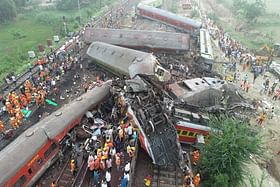The arrested Railway employees have been identified as Arun Kumar Mahanta, senior section engineer; Mohammad Amir Khan, section engineer; and technician Pappu Kumar.
The Central Bureau of Investigation arrested three railways employees on Friday, acting upon the Balasore train accident case.
The CBI action came after the Commissioner Railway Safety submitted its report into the horrific train accident in Odisha involving a triple-train pile-up, which claimed over 290 lives and injured nearly 1000 passengers on June 2 at Bahanaga Bazar station.
The arrested Railway employees have been identified as Arun Kumar Mahanta, senior section engineer; Mohammad Amir Khan, section engineer; and technician Pappu Kumar.
According to the premier probe agency, the accused have been arrested under sections 304 and 201 of the Indian Penal Code for “their action which led to the incident,” without describing what they exactly did.
The two stringent sections related to culpable homicide and destruction of evidence have been added by the CBI in its case now after a month-long investigation. The agency had not invoked these sections in its first information report (FIR) filed last month, which was a re-registration of the Odisha police’s case.
The CRS report on the Balasore accident found the signalling system faulty and flagged “lapses at multiple levels”.
The CRS report blamed repair works hours before the accident for the Coromandel Express going on a collision course with a goods train on another track.
The Railways, however, did not make public the CRS probe report on the Balasore triple train accident to ensure that there is no “influence or interference” on the CBI’s ongoing investigation in the case, according to officials matter with the matter.
The arrest came weeks after Railway Minister Ashwini Vaishnaw said the “root cause” of the accident and the people behind the “criminal” act had been identified.
Railway officials also indicated that possible “sabotage” and tampering with the electronic interlocking system, which detects the presence of trains, could have led to the accident.


